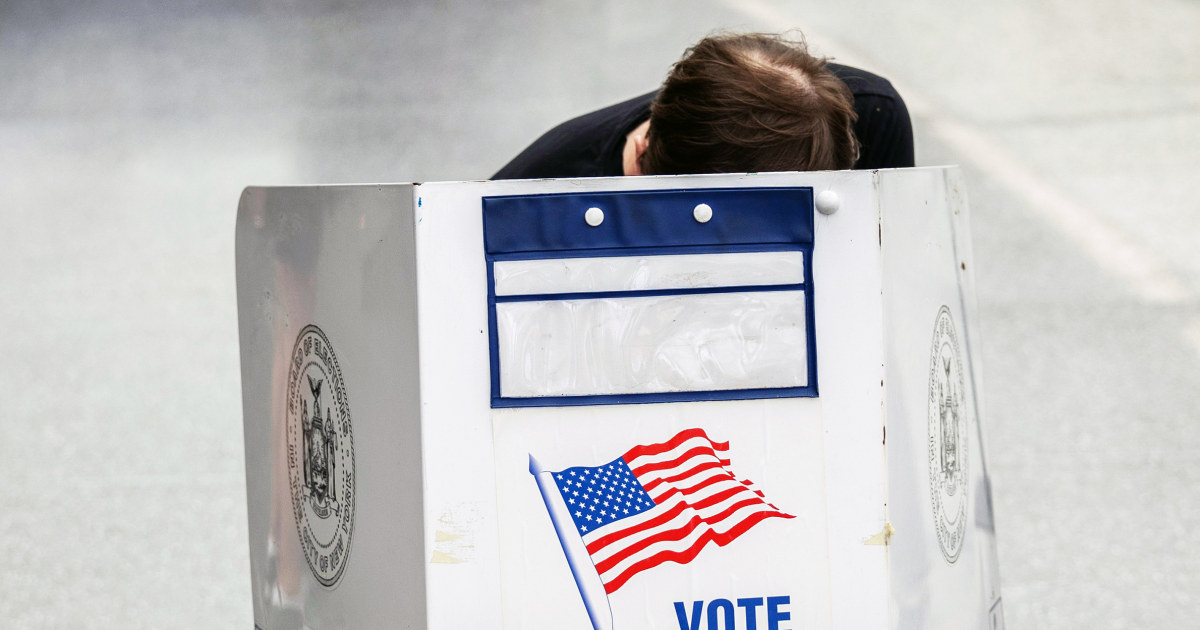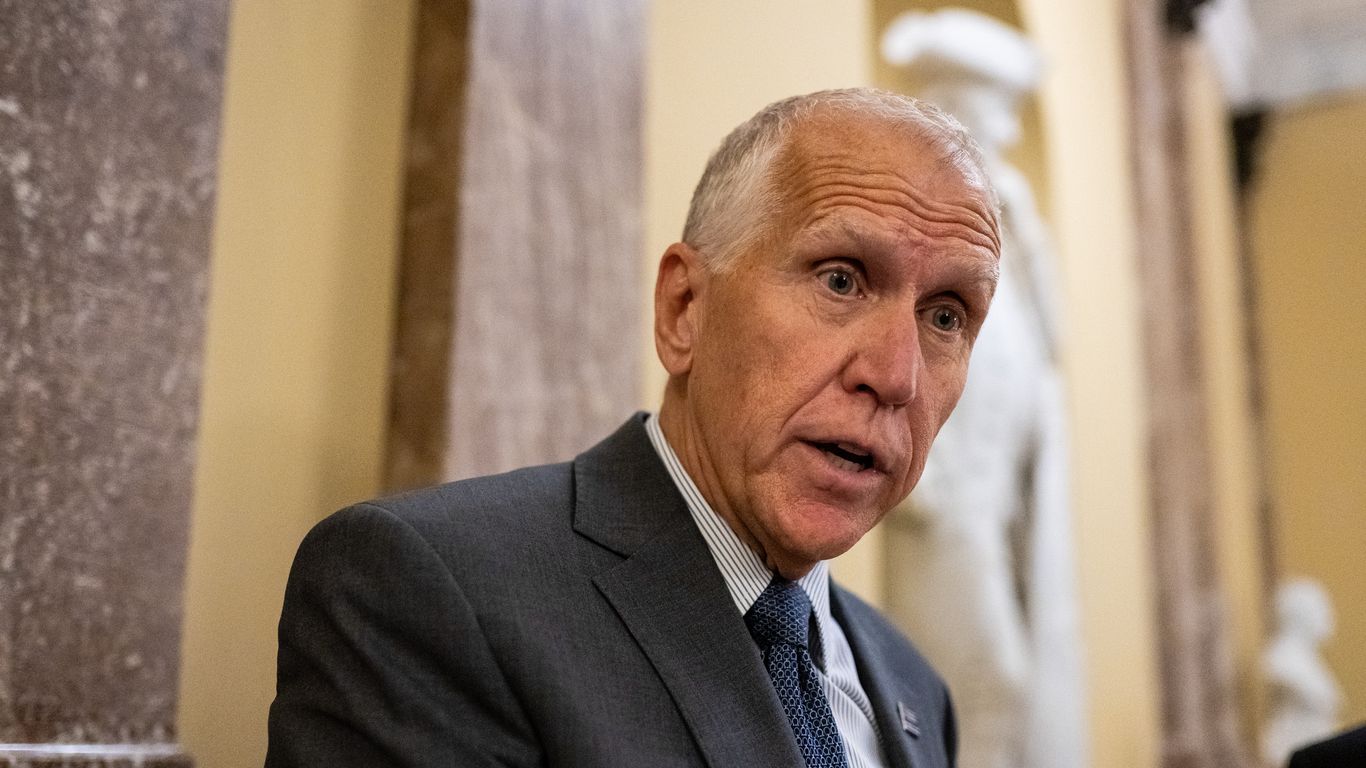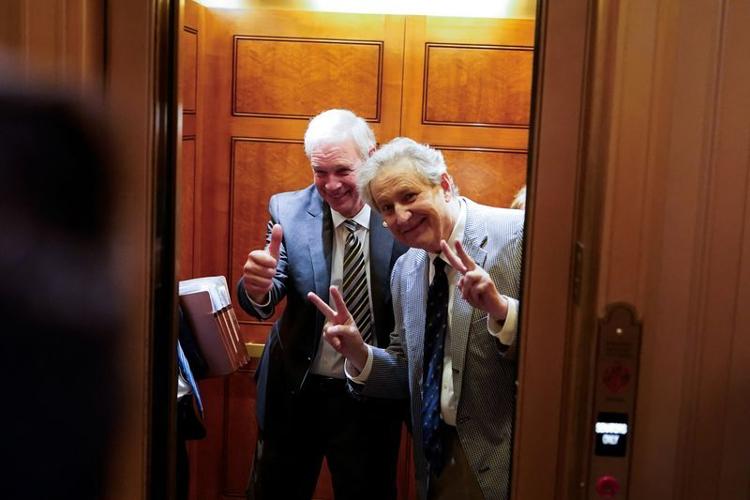Labour Leader Starmer's Slow-Motion Humiliation in House of Commons

Introduction
The recent session in the House of Commons was a slow-motion humiliation for Labour leader Keir Starmer as he failed to maintain control over his party and the chamber. The BBC's political editor Chris Mason and chief political correspondent Henry Zeffman were present to witness the chaos.
Background
The session was centered around the controversial welfare bill, which aims to cut the £20 weekly increase in Universal Credit for millions of people. This decision has sparked a lot of debate and opposition, with many arguing that it will push vulnerable individuals and families into poverty.
Current Scenario
As the session began, it was clear that Starmer had lost control of his party. Several Labour MPs rebelled against his leadership, openly defying his instructions to abstain from voting on the bill. This move not only showed the division within the Labour party but also weakened Starmer's authority as the leader.
The chaos continued as the Conservative party and other opposition parties, such as the SNP, took advantage of the situation and called for division votes on various amendments to the bill. This led to lengthy and heated debates, with Starmer struggling to keep his party in line and effectively oppose the bill.
As the votes were counted, it became evident that the government had successfully passed the bill, with a majority of 35 votes. This was a significant defeat for the Labour party and Starmer, who had promised to fight against the bill and protect those in need.
The Fallout
The aftermath of the session has been a blow to Starmer's leadership. His failure to control his party and effectively oppose the bill has raised doubts about his ability to lead the opposition and hold the government accountable. This has also caused division within the Labour party, with some members expressing disappointment and frustration towards Starmer's leadership.
This slow-motion humiliation for Starmer is a clear indication of the challenges he faces in maintaining party unity and effectively opposing the government's policies. It will be interesting to see how he bounces back from this defeat and regains control of his party in the coming weeks.
Conclusion
The recent session in the House of Commons was a disastrous one for Labour leader Keir Starmer, with the government successfully passing the controversial welfare bill and Starmer losing control of his party. This slow-motion humiliation has raised questions about Starmer's leadership and the future of the Labour party. It remains to be seen how he will bounce back from this defeat and regain the trust of his party and the public.
About the People Mentioned
Keir Starmer
Keir Starmer, born on September 2, 1962, in London, England, is a British politician and barrister. He grew up in Oxted, Surrey, with his father working as a toolmaker and his mother as an NHS nurse. Starmer was the first in his family to attend university, studying law at the University of Leeds and later earning a postgraduate degree from the University of Oxford[2][3]. Before entering politics, Starmer had a distinguished career as a barrister. He qualified in 1987 and was appointed Queen's Counsel (QC) in 2002. Notably, he served as the Director of Public Prosecutions from 2008 to 2013, leading the Crown Prosecution Service[2]. He was knighted in 2014 for his contributions to criminal justice[2]. Starmer was elected as a Member of Parliament for Holborn and St Pancras in 2015. He became the Shadow Minister for Immigration under Jeremy Corbyn but later resigned in protest. He then served as Shadow Secretary of State for Exiting the European Union[5]. In April 2020, he was elected as the leader of the Labour Party, winning with a significant majority in the first round of voting[5]. In July 2024, Starmer became the Prime Minister of the United Kingdom following a landslide Labour victory in the general election, replacing Rishi Sunak[1][4]. As Prime Minister, he is focused on implementing Labour's manifesto, which includes objectives related to the economy, crime, healthcare, education, and climate change[1]. His leadership marks a significant shift in British politics, emphasizing national renewal and change[4]. Starmer is married to Victoria Starmer, an NHS worker, and they have two children[4].
Chris Mason
Chris Mason is an English actor born on February 14, 1991, in Edge Hill, Liverpool, England. He is best known for his television roles including Chad Gekko, the husband of Veronica Lodge, in the 2021 season of *Riverdale*, and as Keiran Atreides in the 2024 Max series *Dune: Prophecy*. Mason began his career with notable roles in the miniseries *The Fades* (2011) and *Lightfields* (2013), and his first film appearance was in *Vampire Academy* (2014). In 2017, he had a recurring role as Leo Humphries in the third season of *Broadchurch*[2][6]. Mason has been married to American actress Spencer Locke since 2017, and together they have a daughter named Monroe, born in 2020[2][6]. He continues to work actively in television, contributing to both dramatic and genre series. Separately, another Chris Mason is a Canadian former professional ice hockey goaltender, born April 20, 1976, in Red Deer, Alberta. He played in the NHL primarily for the Nashville Predators, Atlanta Thrashers/Winnipeg Jets, and St. Louis Blues over a career spanning from 1997 to 2015. After leaving the NHL in 2013, he retired with the Augsburger Panther of the German DEL. Since retirement, he has worked as a color commentator for the Nashville Predators on Bally Sports South[1]. Additionally, Chris Mason is a prominent British political correspondent and presenter, currently serving as the BBC Political Editor since 2022. He started his journalism career in 2001, has reported extensively for the BBC, and presented the popular political podcast *Brexitcast*, later renamed *Newscast*. He also chairs the BBC Radio 4 program *Any Questions?* since 2019[9]. Finally, Christopher E. Mason, PhD, is a leading genomics scientist and professor at Weill Cornell Medicine, known for his work in computational biomedicine, genome engineering, and space medicine. He has received numerous prestigious awards and directs several scientific initiatives[10]. The name "Chris Mason" thus refers to multiple notable individuals across acting, sports, journalism, and science.
Henry Zeffman
Henry Zeffman is a prominent British journalist, currently serving as the Chief Political Correspondent for BBC News, a position he assumed in August 2023. Born in London in 1990, Zeffman was educated at Highgate School and later attended Brasenose College, Oxford, where he studied Philosophy, Politics, and Economics (PPE). During his time at Oxford, he held the role of President of the Junior Common Room, showcasing his leadership skills and interest in public affairs. Zeffman's career in journalism began after winning the prestigious Anthony Howard Award for Young Journalists in 2015. This award included fellowships at *The Times*, *The Observer*, and *New Statesman*. He joined *The Times* as a political reporter and quickly rose through the ranks, eventually becoming a political editor. His work at *The Times* earned him recognition for his ability to analyze complex political issues and present them in an accessible manner. Zeffman's reporting was marked by its clarity, balance, and insight, making him a trusted voice in British political journalism. In addition to his work at *The Times*, Zeffman has been recognized with the Young Journalist of the Year award at the 2019 National Press Awards. His coverage of significant political events, including Brexit negotiations and general elections, has solidified his reputation as an authoritative figure in political reporting. As Chief Political Correspondent for BBC News, Zeffman continues to play a crucial role in shaping political discourse in the UK, providing credible and clear analysis to a broad audience. His current position reflects his ongoing influence and relevance in British journalism.
About the Organizations Mentioned
BBC
## Overview The British Broadcasting Corporation (BBC) is the world’s oldest and largest national broadcaster, serving as a cornerstone of public service media in the United Kingdom and beyond[1][2]. Headquartered in London, the BBC operates under a royal charter and is primarily funded by a television licence fee paid by UK households, ensuring its editorial independence from both government and commercial interests[1][2]. This model allows the BBC to fulfill its mission to “inform, educate, and entertain” with impartiality at its core[3]. ## History and Evolution The BBC was founded on October 18, 1922, as the British Broadcasting Company Ltd., evolving into a public corporation under royal charter on January 1, 1927[1][2]. Its first Director-General, John Reith, established principles of independence and public service that continue to guide the organization. The BBC launched its television service in 1936, pioneering broadcasting technology, and expanded globally with the BBC World Service in 1932, now broadcasting in 28 languages[1][2]. ## Key Achievements The BBC has been a trailblazer in broadcasting, introducing innovations such as regular television broadcasts, color TV, and digital platforms like BBC iPlayer[1][2]. It has earned a reputation for high-quality journalism, producing globally recognized programs in news, drama, and documentary. The BBC’s international arm, BBC Studios, commercializes content worldwide, while the BBC World Service remains a vital source of news in regions with limited press freedom[1]. The corporation has received numerous accolades, including the Queen’s Award for Enterprise for its international business achievements[1]. ## Current Status and Digital Transformation With over 21,000 employees, the BBC remains a dominant force in media, generating £5.4 billion in annual income, mostly from licence fees[2]. It operates multiple TV channels, radio stations, and a robust online presence, including BBC News Online and BBC.com[1
House of Commons
The **House of Commons** is the elected lower chamber of the United Kingdom's Parliament, consisting of 650 Members of Parliament (MPs), each representing a UK constituency. It serves as the primary legislative authority, responsible for debating, amending, and passing laws, particularly those related to taxation and public spending, which only it can initiate. The House also holds the Government accountable through questioning, debates, and oversight functions[2][3][5]. Historically evolving from medieval councils, the House of Commons gained supremacy over the aristocratic House of Lords through statutes like the Parliament Acts of the 20th century, which limit the Lords’ power to delay legislation, especially money bills. The monarch’s role is largely ceremonial, with Royal Assent given almost automatically to bills passed by the Commons. The Prime Minister, who leads the Government, must be an MP, and the ruling party forms the cabinet from Commons members[2][5][6]. Key functions of the House of Commons include: - **Legislation**: Initiating and passing laws, particularly financial legislation, which the House of Lords cannot block or amend significantly[2][5]. - **Government oversight**: Questioning ministers and scrutinizing government policies and expenditures[3]. - **Representation**: MPs represent the interests of their constituents, balancing local and national concerns[1][4]. The Speaker, elected by MPs, moderates debates and ensures orderly conduct, voting only to break ties, typically in favor of maintaining the status quo[2]. Notable is the House's role in shaping modern British governance by enabling democratic representation and accountability in a constitutional monarchy. Its procedures and powers make it a key institution for understanding UK politics, business regulations, and policy developments, particularly relevant for those interested in how government actions affect economic and technological sectors[3][7].
Conservative party
The **Conservative Party** is the oldest political party in the United Kingdom and arguably the world, with origins tracing back to the Tory faction of the late 17th century. It officially adopted the name "Conservative" in the 1830s under Sir Robert Peel, who articulated its principles in the 1834 *Tamworth Manifesto*. This manifesto emphasized reforming abuses, maintaining law and order, establishing an orderly tax system, and supporting land interests, trade, and industry, laying the groundwork for the modern party[1][2][3][5]. Historically, the party evolved from an aristocratic coalition into a broad-based political force under leaders such as Benjamin Disraeli in the late 19th century. Disraeli expanded the party's appeal beyond landed interests by championing social reform and imperial policy, thereby attracting middle-class and working-class voters. The Conservatives have been central to British governance for much of the past two centuries, alternating dominance with the Labour Party since the 1920s[3][5][6]. Key achievements include shaping Britain's industrial and imperial policies in the 19th century, managing Britain's role during World War II under Winston Churchill, and spearheading significant economic and social reforms under Margaret Thatcher from 1979 to 1990. Thatcherism, characterized by free-market policies, deregulation, and reduced state intervention, marked a radical shift in British politics and economics. The party's contemporary history involves adapting to changing political landscapes, including leadership transitions and electoral challenges[4][6]. Currently, the Conservative Party remains a major political force in the UK, known for its centre-right stance advocating fiscal conservatism, free enterprise, and a strong national defense. It continues to influence business and technology sectors by promoting innovation, deregulation, and investment in emerging industries, aligning with its historical emphasis on trade and industry[6]. Notably, the Conservative Party maintains a legacy of political innovation, from early organizational reforms like the Carlton Club t
SNP
The term "SNP" can refer to two distinct organizations: **SNP Schneider-Neureither & Partner** and **SNP Technologies Inc.** Both are involved in the technology sector but operate in different capacities. ## SNP Schneider-Neureither & Partner SNP Schneider-Neureither & Partner is a software provider and IT consulting company based in Heidelberg, Germany. It specializes in transforming data within enterprise resource planning (ERP) systems, enabling companies to implement changes in business applications efficiently. SNP helps organizations leverage new technologies to transform their business models. They focus on data transformation, particularly in migrating and managing ERP systems like SAP, which is crucial for businesses adapting to digital changes[1][6]. ## SNP Technologies Inc. SNP Technologies Inc., headquartered in Hamden, Connecticut, is a leading provider of innovative cloud-based solutions. It specializes in Microsoft Azure, focusing on cloud infrastructure, security, data, AI, and modern workplace solutions. SNP Technologies delivers scalable and robust industry-specific solutions, tailoring services to drive innovation and enhance efficiency across diverse sectors, including finance and healthcare[2][3][4]. ## Key Achievements and Current Status - **SNP Schneider-Neureither & Partner**: Notable achievements include rapid SAP system migrations, such as Coop's SAP S/4HANA migration to the cloud in just 10 hours[6]. - **SNP Technologies Inc.**: Achievements include holding 14 Microsoft Specializations, positioning it as a trusted partner within the Microsoft ecosystem. SNP Technologies is committed to driving digital transformation through Azure solutions, enhancing customer experience and operational efficiency[3][4]. Both organizations are recognized for their innovative approaches to technology and business transformation, making them significant players in their respective fields.
Labour party
## The Labour Party: A Comprehensive Overview The Labour Party, founded in 1900 as the Labour Representation Committee (LRC), is a major political party in the United Kingdom. It emerged as a response to the working-class need for independent parliamentary representation, distinct from the Liberal Party. The LRC officially became the Labour Party in 1906, marking a significant shift towards a unified voice for trade unions and socialists. ### History The Labour Party's early years were marked by slow growth, but events like the Taff Vale case in 1901 and electoral agreements with the Liberals accelerated its progress. By 1918, the party had reconstituted itself with a socialist constitution and expanded its electoral base significantly following the Representation of the People Act. This act extended voting rights to all men over 21 and women over 30, providing a fertile ground for Labour's rise. By 1922, Labour had become the official opposition to the Conservative Party. ### Key Achievements - **Establishment of the NHS**: Under Labour governments, significant social reforms were implemented, including the establishment of the National Health Service (NHS) in 1948. - **Social and Economic Reforms**: Labour has been instrumental in implementing policies like the minimum wage, progressive taxation, and expanded social services. - **Legislative Milestones**: Notable achievements include the Wheatley Housing Act, which aimed to increase affordable housing. ### Current Status Today, the Labour Party remains a major force in British politics, often alternating with the Conservative Party in government. It continues to advocate for progressive policies, including environmental and social reforms. Despite internal divisions and challenges, Labour remains committed to improving living standards and promoting social justice. ### Notable Aspects - **Coalition Nature**: The Labour Party is an uneasy coalition of trade unions, socialists, and reformists, reflecting its diverse origins. - **Leadership and Influence**: Past leaders like Ramsay MacDonald and Keir Hardie


















